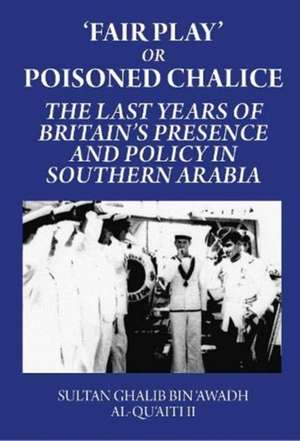Fair Play or Poisoned Chalice: The Last Years of Britain's Presence and Policy in Southern Arabia
Autor Sultan Ghaliben Limba Engleză Hardback – 7 sep 2021
Preț: 212.47 lei
Preț vechi: 260.58 lei
-18% Nou
Puncte Express: 319
Preț estimativ în valută:
40.66€ • 42.34$ • 34.36£
40.66€ • 42.34$ • 34.36£
Carte disponibilă
Livrare economică 17 februarie-03 martie
Preluare comenzi: 021 569.72.76
Specificații
ISBN-13: 9781850773313
ISBN-10: 1850773319
Pagini: 320
Ilustrații: 80 pp plate section
Dimensiuni: 154 x 236 x 36 mm
Greutate: 0.86 kg
Editura: Global Book Sales
ISBN-10: 1850773319
Pagini: 320
Ilustrații: 80 pp plate section
Dimensiuni: 154 x 236 x 36 mm
Greutate: 0.86 kg
Editura: Global Book Sales
Notă biografică
Sultan Ghalib was primarily educated in England at Millfield School, then Magdalen College (Oxford) and Magdalene College (Cambridge). The last Sultan of Hadhramaut (the Qu'aiti State), born in 1948, he became the Crown Prince upon his Grandfather HH Sultan Sir Saleh bin Ghalib's death in 1956 following his father Sultan 'Awadh's accession and was accorded official recognition by the British Government as the Protecting and Advisory power. "Welcomed by almost every class", according to the British intelligence officer Ledger upon ascending the throne in 1966 due to his father's demise, he left his home against his wishes upon British mandatory advice in order to meet the United Nations' Mission on South Arabia's Independence in Geneva, only to find himself stranded abroad. The British presence was unexpectedly withdrawn from his State in his absence and he was to be informed of their inability to convey him back home from their seat in Aden, then the region's doorway to the outside world, "for security reasons". All this took place within the space of just over ten days upto early September 1967, and while he was still allied to Britain and he and his subjects were under British protection. Meanwhile, South Arabia's date of independence was also suddenly brought forward by nearly forty days to 30th November 1967, when the People's Republic of South Yemen was born. This book is the untold story (at least as far as Hadhramaut is concerned) of those last few years of British presence in the region. It is an insider's view of the events that took place and the background to them. In this, the Author may be considered to be in the advantageous position of examining them from the indigenous insider's viewpoint while taking equal note of those of the other sides involved due to his academic background and training. He has already a number of articles and books to do with the region to his credit in Arabic and in English. These apart from being introduced by such personalities as HRH Prince Muhammad al-Faisal, HE Professor Ekmeledddin Ihsanoglu (the Former Secretary General of the OIC) and the late scholar and poet HE Shaikh 'Abdullah Ba'l-Khair, have been creditably reviewed by the world of academe with Professor T. Winter of Cambridge University, for example, describing him as "one the leading experts in Arabian history".
